

The Art of Disappointing Others - Ten Directions. Most people won’t recommend disappointing the people you report to as a strategy for furthering your career.
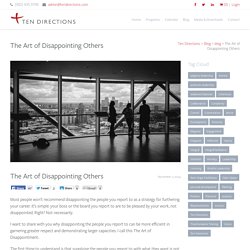
It’s simple: your boss or the board you report to are to be pleased by your work, not disappointed. Right? Not necessarily. The Three Qualities of People I Most Enjoy Working With. Six things that will demoralise staff. Lani Morris: trust is key in maintaining a positive working environment.
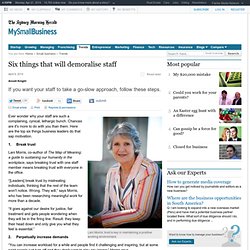
Ever wonder why your staff are such a complaining, cynical, lethargic bunch. Chances are it's more to do with you than them. Here are the top six things business leaders do that sap motivation. 1. Break trust Lani Morris, co-author of The Map of Meaning: a guide to sustaining our humanity in the workplace, says breaking trust with one staff member means breaking trust with everyone in the office. “[Leaders] break trust by mistreating individuals, thinking that the rest of the team won't notice. Advertisement “It goes against our desire for justice, fair treatment and gets people wondering when they will be in the firing line. Transformational Leadership. By Werner H.

Erhard and Michael C. Jensen In this paper we argue that the four ways of being we identify as constituting the foundation for being a leader and the effective exercise of leadership are also the foundation for an extraordinary organization and the foundation of an extraordinary personal life. We start with a brief overview of each of these four foundations before going into an expanded discussion of each.
→Being Authentic Being authentic is being and acting consistent with who you hold yourself out to be for others, and who you hold yourself to be for yourself. Can Work Be a Spiritual Experience? I don't think work-life balance is the most-important factor for people feeling engaged on the job.
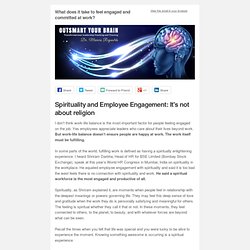
Yes employees appreciate leaders who care about their lives beyond work. But work-life balance doesn't ensure people are happy at work. The work itself must be fulfilling. In some parts of the world, fulfilling work is defined as having a spiritually enlightening experience. I heard Shriram Darbha, Head of HR for BSE Limited (Bombay Stock Exchange), speak at this year’s World HR Congress in Mumbai, India on spirituality in the workplace. Spirituality, as Shriram explained it, are moments when people feel in relationship with the deepest meanings or powers governing life. Recall the times when you felt that life was special and you were lucky to be alive to experience the moment. Your spirit yearns for these moments, to feels alive and full while working.
Simon Sinek: Serve Those Who Serve Others. On September 17, 2009, Simon Sinek stepped onto a small stage for a local gathering…and proceeded to blow away the world.

The event was TEDx Puget Sound. He had no slides, no fancy presentation. Just an idea and an easel. For 18 minutes, he spoke about an awakening. Something he called “the golden circle,” and the need to know your “why.” But that’s just the beginning… The event was filmed and posted to Youtube 11 days later. Character Strengths: VIA Pro Report Tutorial. Learning to Learn. Eight Ways to Find More Meaning at Work. Do you experience meaning at work—or just emptiness?

In the United States people spend on average 35-40 hours working every week. That’s some 80,000 hours during a career—more time than you will spend with your kids, probably. Beyond the paycheck, what does work give you? Few questions could be more important. It is sad to walk through life and experience work as empty, dreadful, a chore—sapping energy out of your body and soul. Of course, different people look for different types of meanings—and, moreover, different workplaces provide different meanings. So, what are the sources of meaningful experiences at work? Purpose 1. The problem, however, is that most work doesn’t have such a higher purpose, either because work is basically mundane or because—let’s face it—the company doesn’t really have a social mission.
Is Attention the Secret to Emotional Intelligence? New research suggests—is that your phone?
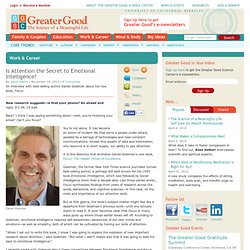
Go ahead and reply. It’s OK, I’ll wait. Back? I think I was saying something about—wait, you’re checking your email? Grateful Organizations Quiz. Does your organization elicit gratitude--or make people feel taken for granted?
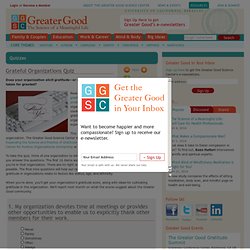
Research suggests that gratitude boosts morale and productivity in organizations--yet people usually don't express gratitude to or within their organization. In fact, people are less likely to feel or express gratitude at work than anyplace else. Six Habits of Highly Grateful People. I’m terrible at gratitude.
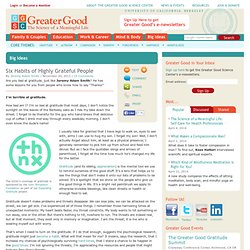
How bad am I? I’m so bad at gratitude that most days, I don’t notice the sunlight on the leaves of the Berkeley oaks as I ride my bike down the street. I forget to be thankful for the guy who hand-brews that delicious cup of coffee I drink mid-way through every weekday morning. I don’t even know the dude’s name! I usually take for granted that I have legs to walk on, eyes to see with, arms I can use to hug my son. Gratitude (and its sibling, appreciation) is the mental tool we use to remind ourselves of the good stuff. The Signs of a Leader's Empathy Deficit Disorder. Leadership And Influence Courseware - Soft Skills Training Materials. Module One: Getting Started Icebreaker Housekeeping Items The Parking Lot Workshop Objectives Module Two: The Evolution of Leadership Defining Leadership Characteristics of a LeaderLeadership Principles A Brief History of Leadership Historical Leaders Modern Leaders The Great Man Theory The Trait Theory Transformational Leadership Summary Module Three: Situational Leadership.
